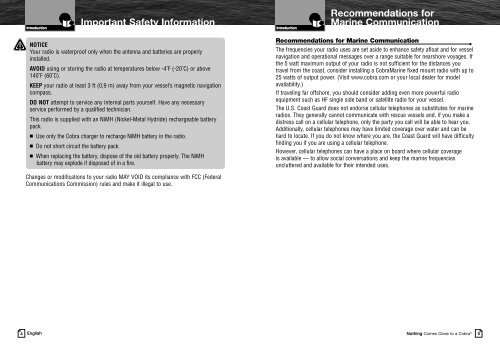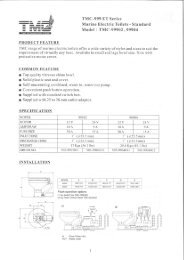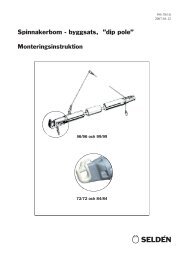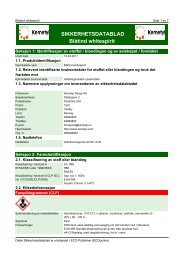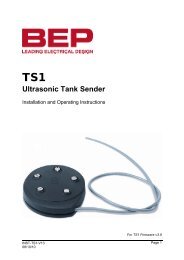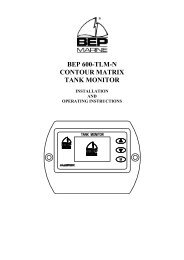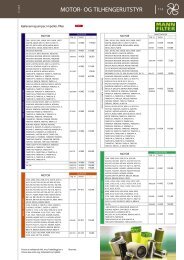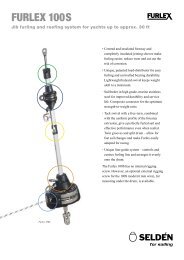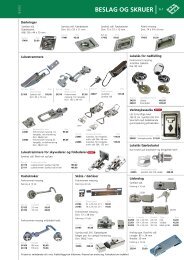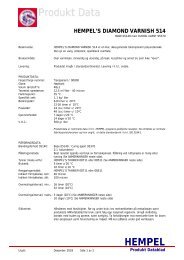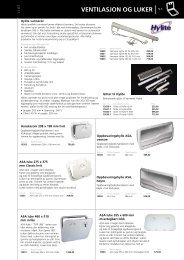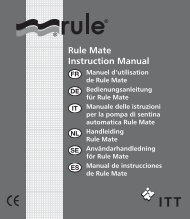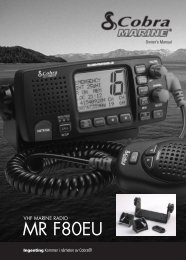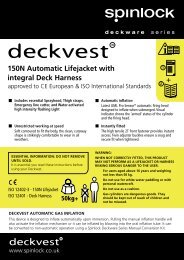tionCustomerAssistanceIntroductionImportant Safety InformationIntroductionRecommendations forMarine Communicatione Caution WarningIntro Operation CustomerAssistanceWarrantyNOTICEYour radio is waterproof only when the antenna and batteries are properlyinstalled.CustomerInstallationAssistanceAVOID using or storing the radio at temperatures below -4˚F (-20˚C) or above140˚F (60˚C). Secondary IconsKEEP your radio at least 3 ft (0,9 m) away from your vessel’s magnetic navigationcompass.DO NOT attempt to service any internal parts yourself. Have any necessaryNotice Caution Warningservice performed by a qualified technician.This radio is supplied with an NiMH (Nickel-Metal Hydride) rechargeable batterypack.■ Use only the <strong>Cobra</strong> charger to recharge NiMH battery in the radio.■ Do not short circuit the battery pack.■ When replacing the battery, dispose of the old battery properly. The NiMHbattery may explode if disposed of in a fire.Intro Operation CustomerAssistanceInstallationNoticeCustomerAssistanceWarrantyRecommendations for Marine Communication•The frequencies your radio uses are set aside to enhance safety afloat and for vesselnavigation and operational messages over a range suitable for nearshore voyages. Ifthe 5 watt maximum output of your radio is not sufficient for the distances youtravel from the coast, consider installing a <strong>Cobra</strong>Marine fixed mount radio with up toSecondary Icons25 watts of output power. (Visit www.cobra.com or your local dealer for modelavailability.)If traveling far offshore, you should consider adding even more powerful radioequipment such as HF single side band or satellite radio for your vessel.CautionWarningThe U.S. Coast Guard does not endorse cellular telephones as substitutes for marineradios. They generally cannot communicate with rescue vessels and, if you make adistress call on a cellular telephone, only the party you call will be able to hear you.Additionally, cellular telephones may have limited coverage over water and can behard to locate. If you do not know where you are, the Coast Guard will have difficultyfinding you if you are using a cellular telephone.However, cellular telephones can have a place on board where cellular coverageis available — to allow social conversations and keep the marine frequenciesuncluttered and available for their intended uses.Changes or modifications to your radio MAY VOID its compliance with FCC (FederalCommunications Commission) rules and make it illegal to use.4 EnglishNothing Comes Close to a <strong>Cobra</strong> ®5
IntroductionFCC Licensing Information FCC Licensing InformationVHF Marine Radio ProtocolsIntro Operation Intro Operation Customer Customer WarrantyAssistance AssistanceFCC Licensing InformationCaution NoticeWarranty<strong>Cobra</strong>Marine VHF radios comply with the FCC (Federal CommunicationsCommission) requirements that regulate the Maritime Radio Service.CustomerInstallationCustomerThe radio operates Installation on allAssistancecurrently allocated Assistance marine channels and is switchable foruse according to U.S.A., International or Canadian regulations. It features instantSecondary Icons Secondary Iconsaccess to emergency Channel 16 and calling Channel 9 as well as NOAA (NationalOceanic and Atmospheric Administration) All Hazards Radio with Alert that can beaccessed by pressing one (1) button.Station LicenseNoticeCaution WarningWarningAn FCC ship station license is no longer required for any vessel traveling in U.S.A.waters which uses a VHF marine radio, RADAR, or EPIRB (Emergency PositionIndicating Radio Beacon), and which is not required to carry radio equipment.However, any vessel required to carry a marine radio on an international voyage,carrying an HF single side band radiotelephone, or carrying a marine satelliteterminal must obtain a station license.FCC license forms and applications for ship and land stations can be downloadedthrough the Internet at www.fcc.gov. Forms can also be obtained by calling the FCCat 888-225-5322.International Station LicenseIf your vessel will be entering the sovereign waters of a country other than theU.S.A. or Canada, you should contact that country’s communications regulatoryauthority for licensing information.Radio Call SignCurrently, the FCC does not require recreational boaters to have a license. TheUnited States Coast Guard recommends that the boat’s registration number andstate of registry (e.g., IL 1234 AB) be used as a call sign and be clearly visible onthe vessel.Canadian Ship Station LicenseYou need a Radio Operator’s Certificate if your vessel is operated in Canadian waters.Radio Operator training and certification is available from the Canadian PowerSquadron. Visit their website (http://www.cps-ecp.ca/english/newradiocard.html),contact the nearest field office or write: Industry of Canada, Radio RegulatoryBranch, Attn: DOSP, 300 Slater Street, Ottawa, Ontario, Canada K1A 0C8.•Secondary IconsVHF Introduction Marine Radio ProtocolsOperation Customer WarrantyIntroIntro AssistanceOperation Intro Operation CustomerAssistanceCustomer WarrantyAssistanceSecondary IconsWarrantyUser Responsibility and Operating LocationsAll users are responsible for observing domestic and foreign government regulationsand are subject CustomerInstallation to severe penalties for violations. The VHF frequencies on your radioAssistanceare reserved for marine use CustomerInstallationCustomerInstallation and require a special license to operate from land,Assistance Assistanceincluding when your boat is on its trailer.Secondary IconsNoticeNOTEThis device complies with part 15 of the FCC Rules. Operation is subject to theCaution Warningfollowing two (2) conditions:1. This device Notice may Caution not Noticecause harmful Caution Warning interference, Warning and2. This device must accept any interference received, including interference thatmay cause undesired operation.FCC Warnings: Replacement or substitution of transistors, regular diodes orother parts of a unique nature, with parts other than those recommended by<strong>Cobra</strong> may cause a violation of the technical regulations of part 80 of the FCCRules, or violation of type acceptance requirements of part 2 of the rules.6 EnglishNothing Comes Close to a <strong>Cobra</strong> ®7


